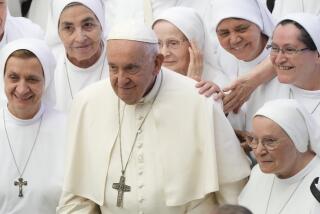Pope Chides Brazil on Financial, Social Problems
BRASILIA, Brazil — Pope John Paul II voiced impatience Monday over serious, longstanding economic and social problems in Brazil, urging President Fernando Collor de Mello and his government to solve them without “more delays.”
Collor, in turn, asked the Pope to use his influence against “injustices” in the relations between rich and poor countries.
John Paul arrived in the Brazilian capital Monday evening, two days after beginning a 10-day tour of the world’s most populous Roman Catholic country. Earlier Monday, he emphasized the need for agrarian reform to benefit millions of landless peasants.
In a speech after meeting privately with Collor for 20 minutes, the Pope said Brazil faces “immense social and economic problems, whose solution does not allow for more delays.”
When Collor took office in March, 1990, he promised deep, rapid economic reforms to promote steady growth and to stop rapid inflation. Today, the economy is stagnant after shrinking by 4% last year; inflation is racing at 16% a month.
So far, the government has failed to carry out plans for major reductions in the government payroll or for privatizing inefficient government enterprises. The under-financed public education and health systems are a shambles, and most of Brazil’s 150 million people are poor.
In a speech to the Pope, Collor said developing countries are handicapped by the terms of international trade, “distorted and limited by protectionism.” He asked the Pope to use his “incomparable authority in international forums” to improve conditions for Third World countries, “contributing to the elimination of so many injustices that still exist in the relations between peoples.”
The president cited Brazilian government programs aimed at economic reform, “more justice in the distribution of national income,” protection of abandoned children, preservation of the natural environment, defense of Indian rights and “intensification of efforts in favor of agrarian reform.”
At a Mass Monday morning in the northern city of Sao Luis de Maranhao, the Pope made a strong appeal for agrarian reform in Brazil--a subject that has sparked political passions in this country since the early 1960s. Conservative generals overthrew the late President Joao Goulart in 1964, partly because he advocated land redistribution.
Since the armed forces relinquished power in 1985, neither Collor nor his civilian predecessor, Jose Sarney, has carried out any major land reform program.
John Paul said Monday that the “high degree of concentration of land ownership in Brazil demands a just agrarian reform.”
According to official figures published Monday in the newspaper Jornal do Brazil, 501 large landholders own 140 million Brazilian acres while about 7 million peasants are landless.
The Pope said land reform would help modernize labor relations in rural Brazil, increase productive work and dampen “violence that already has killed so many persons, including priests.”
The Pastorate of the Land, a Catholic-sponsored social agency, has reported that more than 1,000 rural workers were killed between 1980 and 1991 in conflicts between property owners and land-hungry peasants.
The Pope’s appeal for agrarian reform was tempered by assurances that the church respects private property and does not have the authority itself to solve land problems--an admonition to activist rural priests who have supported squatter movements.
More to Read
Sign up for Essential California
The most important California stories and recommendations in your inbox every morning.
You may occasionally receive promotional content from the Los Angeles Times.










